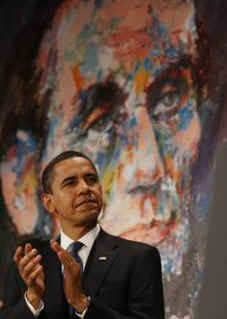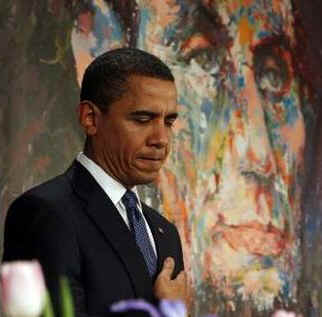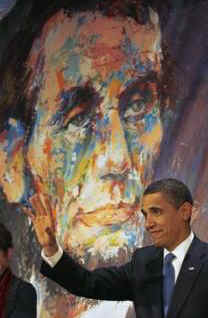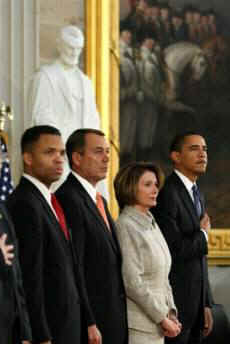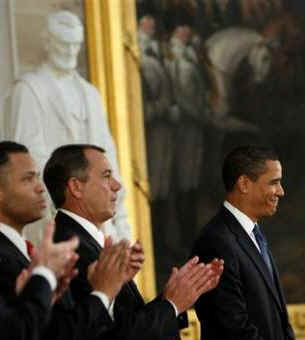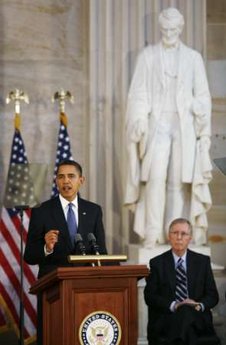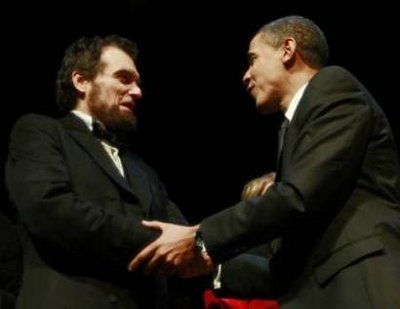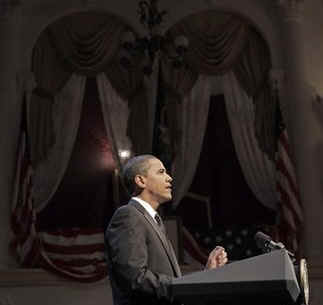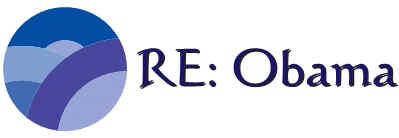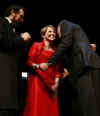| Complete
Text and Photos of Ten Important Barack Obama Speeches from 2002-2008. |
October
2, 2002
Barack Obama speaks
against a war with Iraq
in Chicago, Illinois. |
July
27, 2004
Barack Obama delivers
the Keynote Address at
DNC in Boston, MA. |
January
8, 2008
Obama's passionate
"Yes We Can" speech at
school in Nashua, NH. |
January
20, 2008
Barack Obama speaks at
Martin Luther King's
church in Atlanta, GA. |
March
18, 2008
Barack Obama's inspiring
US racial issues speech
in Philadelphia, PA. |
June
30, 2008
Obama's patriotic "The
America We Love" speech
in Independence, MO. |
July
24, 2008
Obama delivers his only
European tour speech in
Berlin, Germany. |
August
28, 2008
Obama's acceptance
speech at the DNC in
Denver, Colorado. |
October
27, 2008
Obama's speech in last
week of campaign
delivered in Canton, OH. |
November
4, 2008
Obama delivers his first
speech as President-elect
in Chicago's Grant Park. |
Important
Speeches and Remarks of Barack Obama
February 11, 2009 - Washington, DC
February 12, 2009 - Washington DC, and Springfield, Illinois
|
| President
Barack Obama Speeches and Remarks on Lincoln's Bicentennial (1809-2009) |
 |
President
Barack Obama and Lincoln's 200th Anniversary
President
Abraham Lincoln Bicentennial Celebrations 1809-2009
February 11-12,
2009
Speeches and Remarks by President Barack Obama
|
 |
February
12, 2009
President Obama at the Lincoln Birthday Bicentennial Dinner
Springfield, Illinois |
 |
 |
 |
 |
 |
February
12, 2009
President Barack Obama attends the 102nd Abraham Lincoln Association
Banquet in Springfield, Illinois on February 12, 2009.
President Obama delivered the keynote address as part of the Lincoln Bicentennial
Dinner ceremonies. |
|
February 12, 2009
Remarks of President Barack Obama
“What the People Need Done”
Abraham Lincoln Bicentennial
Springfield, Illinois
It is wonderful to be back in Springfield, the city where I got my start
in elected office, where I served for nearly a decade,
and where I launched my candidacy for President two years ago, this week
– on the steps of the Old State Capitol where
Abraham Lincoln served and prepared for the presidency.
It
was here, nearly one hundred and fifty years ago, that the man whose
life we are celebrating today bid farewell to this city
he had come to call his own. On a platform at a train station not far
from where we’re gathered, Lincoln turned to the crowd
that had come to see him off, and said, “To this place, and the
kindness of these people, I owe everything.” Being here tonight,
surrounded by all of you, I share his sentiments.
But looking out at this room, full of so many who did so much for me,
I’m also reminded of what Lincoln once said to a
favor-seeker who claimed it was his efforts that made the difference in
the election. Lincoln asked him, “So you think you
made me President?” “Yes,” the man replied, “under Providence, I
think I did.” “Well,” said Lincoln, “it’s a pretty mess
you’ve
got me into. But I forgive you.”
It is a humbling task, marking the bicentennial of our 16th
President’s birth – humbling for me in particular, I think, for the
presidency of this singular figure in so many ways made my own story
possible.
Here in Springfield, it is easier, perhaps, to reflect on Lincoln
the man rather than the marble giant, before Gettysburg and
Antietam, Fredericksburg and Bull Run, before emancipation was
proclaimed and the captives were set free. In 1854, Lincoln
was simply a Springfield lawyer, who’d served just a single term in
Congress. Possibly in his law office, his feet on a
cluttered desk, his sons playing around him, his clothes a bit too small
to fit his uncommon frame, he put some thoughts
on paper for what purpose we do not know: “The
legitimate object of government,” he wrote, “is to do for the people
what needs to be done, but which they can not, by individual effort, do
at all, or do so well, by themselves.”
To do for the people what needs to be done but which they cannot do on
their own. It is a simple statement. But it
answers a central question of Abraham Lincoln’s life. Why did he land
on the side of union? What was it that made
him so unrelenting in pursuit of victory that he was willing to test the
Constitution he ultimately preserved? What was it
that led this man to give his last full measure of devotion so that our
nation might endure?
These are not easy questions to answer, and I cannot know if I am right.
But I suspect that his devotion to union came
not from a belief that government always had the answer. It came not
from a failure to understand our individual rights
and responsibilities. This rugged rail-splitter, born in a log cabin of
pioneer stock; who cleared a path through the woods
as a boy; who lost a mother and a sister to the rigors of frontier life;
who taught himself all he knew – this man, our first
Republican President, knew, better than anyone, what it meant to pull
yourself up by your bootstraps. He understood that
strain of personal liberty and self-reliance at the heart of the
American experience.
But he also understood something else. He recognized that while each of
us must do our part, work as hard as we can,
and be as responsible as we can – in the end, there are certain things
we cannot do on our own. There are certain things
we can only do together. There are certain things only a union can do.
Only a union could harness the courage of our pioneers to settle the
American west, which is why he passed a Homestead
Act giving a tract of land to anyone seeking a stake in our growing
economy.
Only a union could foster the ingenuity of our farmers, which is why he
set up land-grant colleges that taught them how to
make the most of their land while giving their children an education
that let them dream the American dream.
Only a union could speed our expansion and connect our coasts with a
transcontinental railroad, and so, even in the midst
of civil war, he built one. He fueled new enterprises with a national
currency, spurred innovation, and ignited America’s
imagination with a national academy of sciences, believing we must, as
he put it, add “the fuel of interest to the fire of
genius in the discovery…of new and useful things.” And on this
day, that is also the bicentennial of Charles Darwin’s birth,
let us renew that commitment to science and innovation once more.
Only
a union could serve the hopes of every citizen – to knock down the
barriers to opportunity and give each and every
person the chance to pursue the American dream. Lincoln understood what
Washington understood when he led farmers,
craftsmen, and shopkeepers to rise up against an empire. What Roosevelt
understood when he lifted us from Depression,
built an arsenal of democracy, and created the largest middle-class in
history with the GI Bill. It’s what Kennedy understood
when he sent us to the moon.
All these presidents recognized that America is – and always has been
– more than a band of thirteen colonies, more than
a bunch of Yankees and Confederates, more than a collection of Red
States and Blue States. We are the United States of
America and there isn’t any dream beyond our reach, any obstacle that
can stand in our way, when we recognize that our
individual liberty is served, not negated, by a recognition of the
common good.
That is the spirit we are called to show once more. The challenges we
face are very different now. Two wars, and an
economic crisis unlike any we have seen in our lifetime. Jobs have been
lost. Pensions are gone. Families’ dreams have
been endangered. Health care costs are exploding. Schools are falling
short. And we have an energy crisis that is hampering
our economy, threatening our planet, and enriching our adversaries.
And yet, while our challenges may be new, they did not come about
overnight. Ultimately, they result from a failure to meet
the test that Lincoln set. To be sure, there have been times in our
history when our government has misjudged what we can
do by individual effort alone, and what we can only do together; when it
has done things that people can – or should – do
for themselves. Our welfare system, for example, too often dampened
individual initiative, discouraging people from
taking responsibility for their own upward mobility. With respect to
education, we have all too frequently lost sight of the
role of parents, rather than government, in cultivating a thirst for
knowledge and instilling those qualities of a good
character – hard work, discipline, and integrity – that are so
important to educational achievement and professional success.
But in recent years, we’ve seen the pendulum swing too far in the
opposite direction. It’s a philosophy that says every
problem can be solved if only government would step out of the way; that
if government were just dismantled, divvied up
into tax breaks, and handed out to the wealthiest among us, it would
somehow benefit us all. Such knee-jerk disdain for
government – this constant rejection of any common endeavor – cannot
rebuild our levees or our roads or our bridges.
It cannot refurbish our schools or modernize our health care system;
lead to the next medical discovery or yield the
research and technology that will spark a clean energy economy.
Only a nation can do these things. Only by coming together, all of us,
and expressing that sense of shared sacrifice
and responsibility – for ourselves and one another – can we do the
work that must be done in this country. That is the
very definition of being American.
It is only by rebuilding our economy and fostering the conditions of
growth that willing workers can find a job, companies
can find capital, and the entrepreneurial spirit that is the key to our
competitiveness can flourish. It is only by unleashing
the potential of alternative fuels that we will lower our energy bills
and raise our industries’ sights, make our nation safer
and our planet cleaner. It is only by remaking our schools for the 21st
century that our children will get those good jobs so
they can make of their lives what they will. It is only by coming
together to do what people need done that we will, in
Lincoln’s words, “lift artificial weights from all shoulders [and
give] all an unfettered start, and a fair chance, in the race of
life.”
That is what is required of us – now and in the years ahead. We will
be remembered for what we choose to make of this
moment. And when posterity looks back on our time, as we are looking
back on Lincoln’s, I do not want it said that we
saw an economic crisis, but did not stem it. That we saw our schools
decline and our bridges crumble, but did not rebuild
them. That the world changed in the 21st century, but America did not
lead it. That we were consumed with small things
when we were called to do great things. Instead, let them say that this
generation – our generation – of Americans rose
to the moment and gave America a new birth of freedom and opportunity in
our time.
These are trying days and they will grow tougher in the months to come.
There will be moments when our doubts rise
and our hopes recede. But let’s always remember that we, as a people,
have been here before. There were times when
our revolution itself seemed altogether improbable, when the union was
all but lost, and fascism seemed set to prevail.
And yet, what earlier generations discovered – what we must rediscover
right now – is that it is precisely when we are
in the deepest valley, precisely when the climb is steepest, that
Americans relearn how to take the mountaintop. Together.
As one nation. As one people. That is how we will beat back our present
dangers. That is how we will surpass what trials
may come. And that is how we will do what Lincoln called on us to
do, and “nobly save…the last best hope of earth.”
Thank you, God Bless you, and may God Bless America.
|
February
12, 2009
President Obama at the Lincoln Birthday Bicentennial Congressional
Celebrations
Rotunda, US Capitol, Washington, DC |
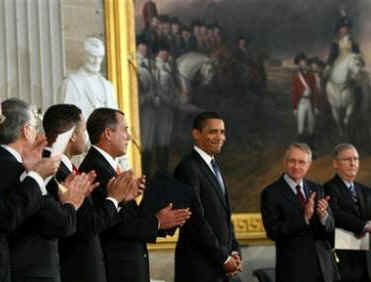 |
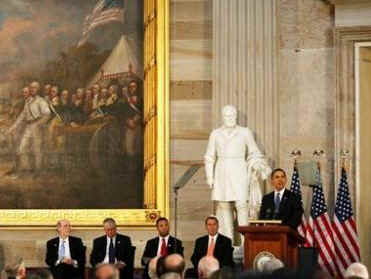 |
February
12, 2009
President Barack Obama speaks in the Rotunda of the US Capitol in Washington,
DC on February 12, 2009 during the
Lincoln Bicentennial Congressional Celebrations honoring the 1809 birth
of President Abraham Lincoln. |
|
Remarks of President Barack Obama
Lincoln Bicentennial Celebration
United States Capitol, Washington, DC
February 12, 2009
It is an honor to be here – a place where Lincoln served, was
inaugurated, and where the nation he saved bid him a
last farewell. As we mark the bicentennial of our 16th President's
birth, I cannot claim to know as much about his life
and works as many of those who are also speaking today, but I can say
that I feel a special gratitude to this singular
figure who in so many ways made by own story possible – and who in so
many ways made America's story possible.
It is fitting that we are holding this celebration here at the Capitol.
For the life of this building is bound ever so closely to
the times of this immortal President. Built by artisans and craftsmen,
immigrants and slaves – it was here, in the rotunda,
that union soldiers received help from a makeshift hospital; it was
downstairs, in the basement, that they were baked
bread to give them strength; and it was in the Senate and House
chambers, where they slept at night, and spent some
of their days.
What those soldiers saw when they looked on this building was a very
different sight than the one we see today. For it
remained unfinished until the end of the war. The laborers who built the
dome came to work wondering whether each day
would be their last; whether the metal they were using for its frame
would be requisitioned for the war and melted down
into bullets. But each day went by without any orders to halt
construction, and so they kept on working and kept on
building.
When President Lincoln was finally told of all the metal being used
here, his response was short and clear: that is as it
should be. The American people needed to be reminded, he believed, that
even in a time of war, the work would go on;
that even when the nation itself was in doubt, its future was being
secured; and that on that distant day, when the guns
fell silent, a national capitol would stand, with a statue of freedom at
its peak, as a symbol of unity in a land still mending
its divisions.
It is this sense of unity, this ability to plan for a shared future even
at a moment our nation was torn apart, that I reflect
on today. And while there are any number of moments that reveal that
particular side of this extraordinary man – that
particular aspect of his leadership – there is one I'd like to share
with you today.
In the war's final weeks, aboard Grant's flagship, The River Queen,
President Lincoln was asked what was to be done with
the rebel armies once General Lee surrendered. With victory at hand,
Lincoln could have sought revenge. He could have
forced the South to pay a steep price for their rebellion. But despite
all the bloodshed and all the misery that each side had
exacted upon the other, no Confederate soldier was to be punished,
Lincoln ordered. They were to be treated, as he put it,
“liberally all round.” All Lincoln wanted was for Confederate troops
to go back home and return to work on their farms and
in their shops. He was even willing, he said, to “let them have their
horses to plow with and…their guns to shoot crows with.”
That was the only way, Lincoln knew, to repair the rifts that had torn
this country apart. It was the only way to begin the
healing that our nation so desperately needed. For what Lincoln never
forgot, not even in the midst of civil war, was that
despite all that divided us – north and south, black and white – we
were, at heart, one nation and one people, sharing a
bond as Americans that could not break.
And
so even as we meet here today, at a moment when we are far less divided
than in Lincoln's day, but when we are
once again debating the critical issues of our time – and debating
them fiercely – let us remember that we are doing so
as servants to the same flag, as representatives of the same people, and
as stakeholders in a common future. That is
the most fitting tribute we can pay – and the most lasting monument we
can build – to that most remarkable of men,
Abraham Lincoln. Thank you.
|
February
11, 2009
President Barack Obama and First Lady Michelle Obama
attend Ford's Theatre Grand Re-Opening, Washington, DC |
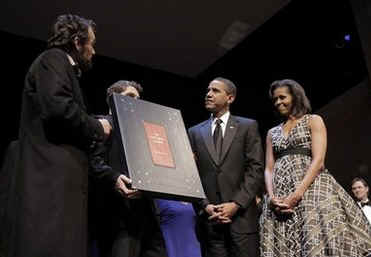 |
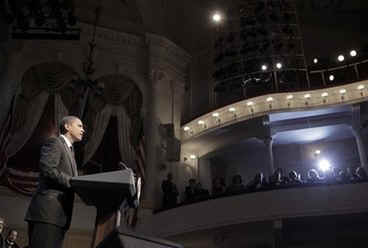 |
February
11, 2009
President Barack Obama and First Lady Michelle Obama attend the
Grand Re-Opening of Ford's Theatre in Washington on
February 11, 2009. President Obama meets a Lincoln actor, receives a
copy of the Gettysburg Address, and speaks just
below the box where President Abraham Lincoln was shot. |
|
Remarks of President Barack Obama
Ford's Theatre, Washington, DC
February 11, 2009
Michelle and I are so pleased to be here to renew and rededicate this
hallowed space. We know that Ford's Theatre will
remain a place where Lincoln's legacy thrives, where his love of the
humanities and belief in the power of education have
a home, and where his generosity of spirit are reflected in all the work
that takes place.
It has been a fitting tribute
to Abraham Lincoln that we've seen and heard from some of our most
celebrated icons of
stage and screen. Because Lincoln himself was a great admirer of the
arts. It is said he could even quote portions of
Hamlet and Macbeth by heart. And so, I somehow think this event captured
an essential part of the man whose life we
celebrate tonight.
As commemorations take place across this country on the bicentennial of
our 16th President's birth, there will be reflections
on all he was and all he did for this nation that he saved. But while
there are any number of moments that reveal the
exceptional nature of this singular figure, there is one in particular
I'd like to share with you.
Not far from here stands our nation's capitol, a landmark familiar to us
all but one that looked very different in Lincoln's time.
For it remained unfinished until the end of the war. The laborers who
built the dome came to work wondering whether each
day would be their last; whether the metal they were using for its frame
would be requisitioned for the war and melted down
into bullets. But each day went by without any orders to halt
construction – so they kept on working and kept on building.
When President Lincoln was finally told of all the metal being used
there, his response was short and clear: that is as it should
be. The American people needed to be reminded, he believed, that even in
a time of war, the work would go on; that even
when the nation itself was in doubt, its future was being secured; and
that on that distant day, when the guns fell silent, a
national capitol would stand, with a statue of freedom at its peak, as a
symbol of unity in a land still mending its divisions.
It
is this sense of unity that is so much a part of Lincoln's legacy. For
despite all that divided us – north and south, black and
white – he had an unyielding belief that we were, at heart, one
nation, and one people. And because of Abraham Lincoln, and
all who've carried on his work in the generations since, that is what we
remain today. Thank you, and good night.
|
| Complete
Text and Photos of Ten Important Barack Obama Speeches from 2002-2008. |
October
2, 2002
Barack Obama speaks
against a war with Iraq
in Chicago, Illinois. |
July
27, 2004
Barack Obama delivers
the Keynote Address at
DNC in Boston, MA. |
January
8, 2008
Obama's passionate
"Yes We Can" speech at
school in Nashua, NH. |
January
20, 2008
Barack Obama speaks at
Martin Luther King's
church in Atlanta, GA. |
March
18, 2008
Barack Obama's inspiring
US racial issues speech
in Philadelphia, PA. |
June
30, 2008
Obama's patriotic "The
America We Love" speech
in Independence, MO. |
July
24, 2008
Obama delivers his only
European tour speech in
Berlin, Germany. |
August
28, 2008
Obama's acceptance
speech at the DNC in
Denver, Colorado. |
October
27, 2008
Obama's speech in last
week of campaign
delivered in Canton, OH. |
November
4, 2008
Obama delivers his first
speech as President-elect
in Chicago's Grant Park. |
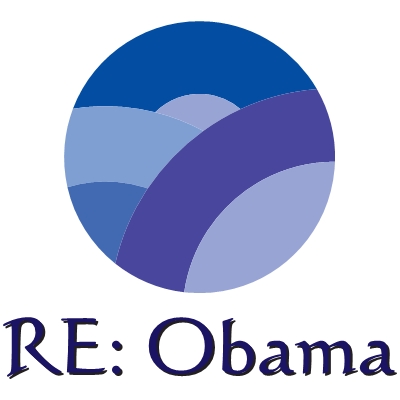 |
| RE:Obama.com
- President Obama Remarks and Speeches on Lincoln - February 11-12, 2009 |
|


